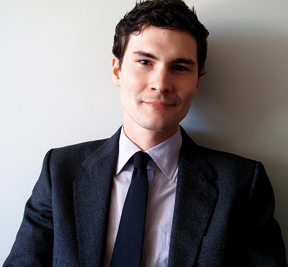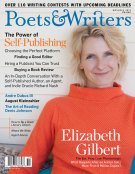To submit a question for the next featured agent, e-mail agentadvice@pw.org or write to Editor, Poets & Writers Magazine, 90 Broad Street, Suite 2100, New York, NY 10004. Questions accepted for publication may be edited for clarity and length.
 Areas of interest: Literary
fiction, narrative nonfiction, memoir, journalism, sports,
business, cultural criticism,
history, science, and biography
Areas of interest: Literary
fiction, narrative nonfiction, memoir, journalism, sports,
business, cultural criticism,
history, science, and biography
Representative clients: Chad Harbach, Hillary Jordan, Robert Kolker, Jane McGonigal, Grant Wahl
Looking for: Query letter and sample chapters (no more than 50 pages)
Preferred contact: E-mail info@thegernertco.com (“Attention: Chris Parris-Lamb” in the subject line)
Agency contact:
The Gernert Company
136 East 57th Street, 18th Floor
New York, NY 10022
Phone (212) 838-7777
Fax (212) 838-6020
www.thegernertco.com
What type of query letter piques your interest?
Jennifer from Milford, Connecticut
One that’s as well written as the book itself. Even better is one that’s short, pithy, and demonstrates the author’s understanding of, and aspirations for, how the book will be received as part of the literary and cultural conversation. I’m much more interested in knowing why an author wrote something and what kinds of books and authors inspired her, than I am in a lengthy synopsis. The latter should take no more than one paragraph.
I’ve read that literary fiction writers should consider submitting book-length manuscripts to contests and independent presses at the same time they are querying agents. This feels unorthodox to me, but given the tight market for literary fiction, maybe it’s warranted. What is your feeling on this?
Anne from Brooklyn, New York
I think that’s probably a wise and realistic approach for short story collections. The fact is, if you’re publishing stories in venues high profile enough to suggest that a collection might be a viable commercial prospect for a major publisher, you’re probably going to be hearing from agents already.
For novels, however, I’d save submissions to contests and independent presses for a second or third round. I don’t think you need to wait until you’ve queried every agent in the world, but make sure you’ve given yourself a chance with a few dozen or so people who seem like they’d be a good fit. You can then continue to submit to other agents while submitting to contests and independent presses.
If I’m a hermit by choice (find crowds draining, don’t do public speaking well), how does that reduce my chances of being published? Would an agent and/or publisher see that as a marketing nightmare?
Sandra from Perris, California
I think the answer depends a great deal on the nature of what you’re writing (and perhaps the degree to which you’re really a hermit). It is almost impossible to promote nonfiction without having the author engage with the world in some way. You can probably get away with avoiding public-speaking events, but if you’re not willing to, say, do an NPR interview about your book, that’s a problem.
Fiction is a little bit different. Whether it’s intended to be high literature or complete pulp, it’s all about what’s on the page and how the reader responds to it. Yes, an author who is willing to do anything and everything to promote his book is valuable to a publisher—but that book has to be good. All else being equal, having written identical books, a social butterfly is more appealing to a publisher than a hermit. But they’d never write identical books, of course! And, speaking for myself here, I think the best fiction requires a kind of monastic discipline, even obsession, on the part of people who create it that doesn’t necessarily lend itself to a raging social life, or building a “platform.” So just be you, and focus on making your book the best it can be. We spend enough time broadcasting ourselves to the ends of the earth, and to me books represent a respite from that. Literature needs more hermits, I say!








